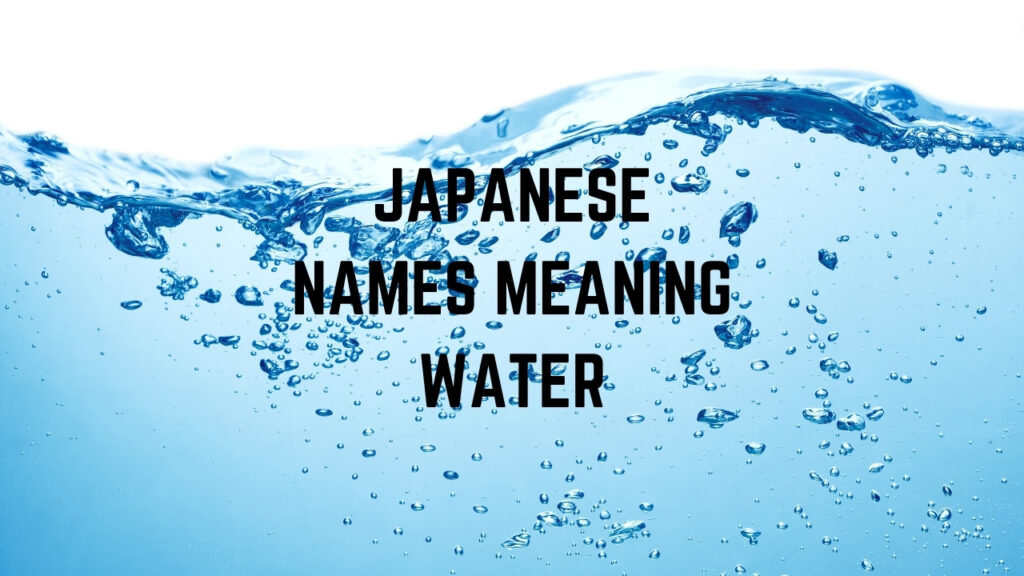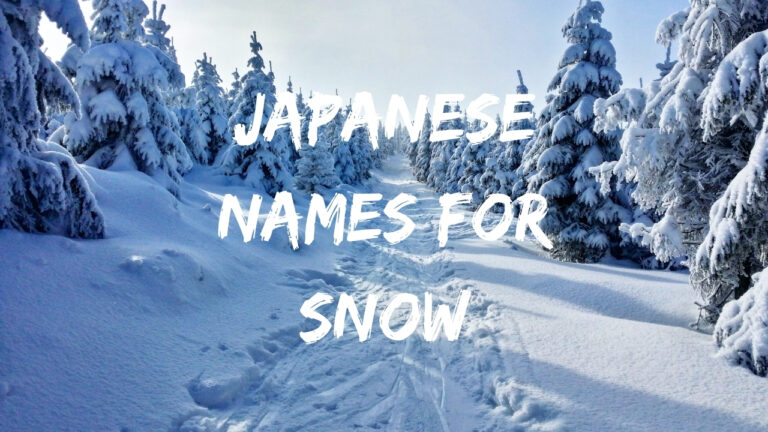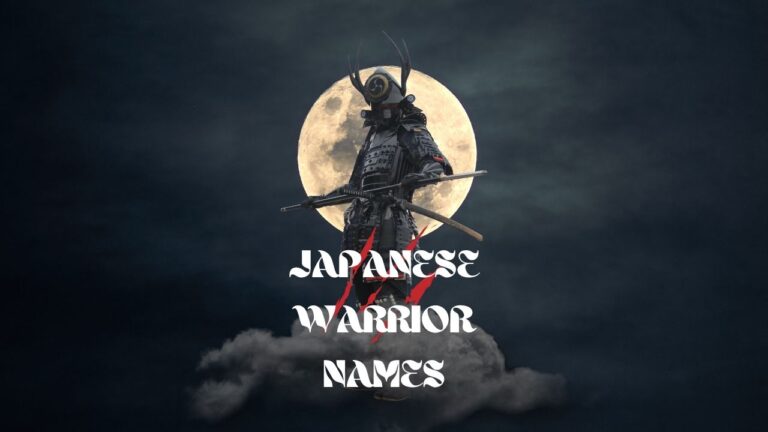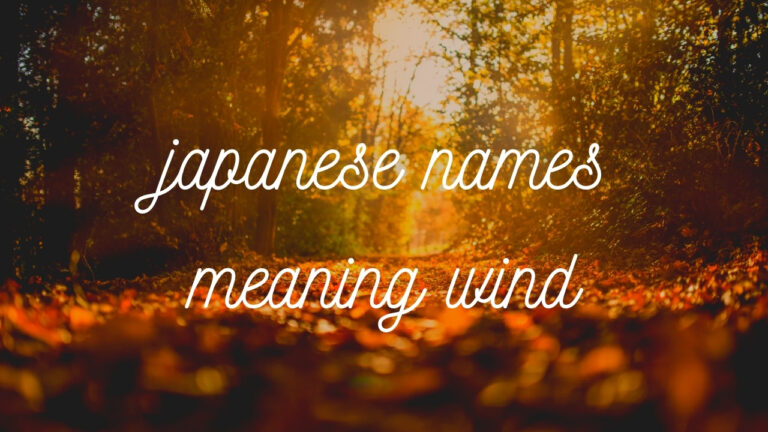120+ Japanese Names Meaning Water – Unique & Spiritual
Water has deep meaning in Japanese culture, often symbolizing purity, calmness, and life. If you’re looking for names with a gentle and refreshing feel, exploring Japanese names meaning water can be a beautiful choice.
Whether you’re searching for Japanese names meaning water girl, water boy, or names that can be used by any gender, there are many lovely options with peaceful meanings. Some Japanese names meaning water unisex are especially versatile and meaningful.
You’ll also find Japanese names meaning water unique in sound and style, perfect if you want something special and rare.
Also read:125+ names in japanese that mean fire

Japanese unisex names that mean water
- Mizuki (水希 / 瑞希) – Mizuki can mean “beautiful water” or “hopeful water,” depending on the kanji. It’s a soft and gentle name used for both boys and girls.
- Minato (湊) – This name means “harbor” or “port,” a place where water meets land, symbolizing peace and connection.
- Kaito (海翔) – While more common for boys, Kaito is unisex and means “ocean fly” or “soaring over the sea,” reflecting freedom and strength over water.
- Harumi (晴海) – Meaning “clear sea” or “sunny ocean,” Harumi brings images of calm, peaceful waters and is used for any gender.
- Aoi (葵 / 青井) – Aoi can mean “blue” or “fresh water well,” and its color meaning also ties to water. It’s a popular unisex name with natural energy.
- Rin (凛 / 琳 / 璘) – While not directly meaning water, some kanji versions imply clarity and water-like purity. It’s sleek and balanced for any gender.
- Sui (水) – Simply means “water” and is very minimalist. Rare but powerful as a name that fully reflects the essence of water.
- Nami (波) – Nami means “wave.” Although used more for girls, it remains unisex and carries the image of gentle or strong tides.
- Shizuku (雫) – This name means “droplet” or “water drop,” giving a soft and delicate water image that suits any gender.
- Umi (海) – Meaning “sea” or “ocean,” Umi is straightforward and deeply rooted in nature, fitting as a gender-neutral name.
- Izumi (泉) – This name means “spring” or “fountain,” symbolizing flowing clean water and renewal. It’s used for all genders.
- Kai (海 / 楓 / 界) – Often meaning “ocean” or “shell,” Kai is short and globally popular. Its ocean meaning ties it to water.
- Mizuho (瑞穂 / 水穂) – Can mean “blessed water” or “water grain,” reflecting abundance and nature. It has soft, fluid energy.
- Seina (星奈 / 清奈) – Depending on the kanji, Seina can mean “pure water” or “clean flow.” It’s gently unisex and has spiritual tones.
- Rei (怜 / 澪) – Rei can mean “wise,” but also “waterway” or “channel” with the kanji 澪, which ties it closely to flowing water.
- Noa (乃愛 / 乃亜) – Noa has a peaceful, floating sound and can be linked to water through its airy, soft tone. It’s gender-neutral in Japan.
- Mio (澪 / 美緒) – Mio can mean “water channel” or “beautiful thread,” blending the idea of beauty and water movement.
- Hinami (陽波 / 日波) – Meaning “sun wave” or “gentle wave,” this name reflects the soft beauty of water touched by light.
- Ruka (瑠夏 / 流夏) – Ruka may mean “flowing summer,” combining the feel of warm, flowing water and brightness. Suitable for any gender.
- Nagisa (渚) – Meaning “shore” or “waterside,” Nagisa is calming and neutral, reflecting the balance between land and sea.
- Fumi (文 / 流美) – When written as 流美, it can mean “flowing beauty.” It’s an old name that feels poetic and timeless.
- Asahi (朝日 / 浅陽) – While it mainly means “morning sun,” kanji like 浅 (shallow) and 陽 (sun) can imply water and light, combining two natural elements.
- Riku (陸 / 琉空) – Typically meaning “land,” but with the right kanji such as 琉 (lapis, linked to water color), it gains a watery, bright feeling.
- Touka (透花 / 冬華) – When written as 透花, it suggests “transparent flower,” giving an image of dewdrops or flowers in water.
- Yuuki (優希 / 悠希 / 湧輝) – One variation uses 湧, meaning “spring water gushing,” and 輝 meaning “shine.” Together, they create the meaning “shining spring water.”
Japanese boy names that mean water
- Masami (正海 / 昌海) – This name combines meanings like “righteous sea” or “prosperous ocean,” often used for boys with strong and calm qualities.
- Tatsumi (辰海) – Made from “dragon” and “sea,” this name gives a powerful water image, symbolizing strength rising from the ocean.
- Kairi (海理 / 海璃) – This name means “ocean logic” or “ocean crystal.” While sometimes unisex, it’s used more for boys with modern kanji.
- Hiroto (大翔 / 洋翔) – With the right kanji, it can mean “soaring over the ocean,” reflecting greatness and movement across water.
- Takumi (匠海) – This form means “master of the sea,” a creative and respectful name for someone skilled and calm like water.
- Shunpei (俊平 / 駿平) – When written with water-related kanji, it can relate to “peaceful tides” or “flowing calm,” showing steadiness.
- Masaru (勝流) – This version uses 流 (flow/stream), giving the meaning “victory that flows,” a name with dynamic energy.
- Rento (蓮翔 / 漣翔) – Using 漣 (ripples) gives the name a meaning like “soaring ripples,” connecting to the gentle but constant motion of water.
- Arashi (嵐 / 嵐水) – Arashi means “storm,” often symbolizing wild weather and ocean waves, making it a strong water-themed name.
- Yuudai (優大 / 湧大) – With 湧 (spring/gushing water), this version means “great spring” or “great flow,” showing powerful beginnings.
- Seiji (清司 / 清治) – Using 清 (pure/clean, often linked with water), Seiji gives off a dignified and peaceful water-inspired meaning.
- Ryouma (涼馬) – 涼 means “cool” or “refreshing,” and when combined with 馬 (horse), it symbolizes strong energy with a calm flow.
- Souma (蒼真 / 颯真 / 漱真) – Using 漱 (rinse/gargle) or 蒼 (deep blue), this name connects to water’s cleansing and deep shades.
- Naoto (直翔 / 尚翔 / 直湧) – With 湧 (gushing spring) included, Naoto can imply “honest spring,” ideal for a clear-hearted boy.
- Reon (怜音 / 涼音) – 涼音 means “cool sound,” symbolizing the sound of flowing or dripping water—gentle and calming.
- Kazuki (和希 / 一樹 / 和水) – Written as 和水, it means “peaceful water,” a name that reflects harmony and serenity.
- Tsubasa (翼 / 津羽) – If written as 津羽, 津 means “port” or “water edge,” and 羽 means “wing,” symbolizing a bird flying over water.
- Haruto (陽翔 / 陽斗 / 悠翔 / 晴翔) – When modified with a kanji like 晴 (clear sky, often used after rain), it hints at freshness after water’s touch.
- Renji (蓮司 / 漣司) – 漣 means “ripples,” giving the name a poetic feel, suggesting steady movement and harmony.
- Soutarou (蒼太郎 / 漱太郎) – Using 蒼 or 漱 adds a sense of water clarity or deep sea blue, paired with a traditional male suffix.
- Yuuma (悠真 / 湧真) – 湧真 means “true spring water,” expressing a straightforward, strong identity linked to natural flow.
- Kouta (康太 / 航太 / 洸太) – 洸 (sparkling water) paired with 太 (great), gives “bright great water,” a radiant and strong water-themed name.
- Ichirou (一朗 / 泉朗) – 泉朗 means “clear spring boy,” combining clarity and traditional masculinity in one fluid name.
- Hayate (疾風 / 波翔) – Using 波翔, it becomes “flying wave,” full of motion and rhythm—suitable for an energetic, free-spirited boy.
- Tomoki (智樹 / 知樹 / 朋樹 / 知泉) – When written as 知泉, it means “wise spring,” representing intelligence and clarity inspired by water.
Japanese girl names that mean water
- Sayumi (紗弓 / 小弓 / 沙弓) – When written as 沙弓, it means “sand bow,” evoking an image of something graceful near the water’s edge.
- Namika (波香 / 奈美佳) – Using 波 (wave), Namika means “fragrant wave” or “gentle wave,” suggesting elegance and calmness.
- Mizuno (水野) – A classic surname used as a given name, it means “field of water,” showing peaceful natural scenery.
- Hinami (陽波 / 日波) – Depending on the kanji, it can mean “sun wave” or “gentle wave touched by light,” giving a warm and serene feeling.
- Sumire (澄玲 / 澄麗) – 澄 means “clear water,” and when paired with graceful characters, it suggests pure beauty.
- Natsumi (夏海 / 夏美) – With kanji like 夏海, it means “summer sea,” giving the image of warm and vibrant ocean waters.
- Sazanami (漣) – A poetic name meaning “ripples,” reflecting gentle movement on the surface of water. It’s elegant and uncommon.
- Yura (由良 / 湯良) – Depending on the kanji, Yura may mean “gentle bay” or “good hot spring,” linked to calm flowing water.
- Misuzu (美涼 / 美鈴 / 水鈴) – Using 涼 (cool) or 水 (water), Misuzu can mean “beautiful coolness” or “water bell,” gentle and feminine.
- Amika (亜美佳 / 雨香) – When written as 雨香, it means “fragrant rain,” a soft and romantic water-related name.
- Nagomi (和海) – This rare combination means “harmonious sea,” blending peace with the vastness of water.
- Shigure (時雨) – A poetic term for “late autumn rain,” often used in literature, this name brings a delicate and melancholic water feeling.
- Rumi (流美) – Meaning “flowing beauty,” Rumi suggests elegance and natural grace, like water gently moving.
- Manami (愛海 / 真波) – Manami can mean “beloved sea” or “true wave,” symbolizing deep emotions and beauty tied to the sea.
- Suzuna (鈴菜 / 涼菜) – Using 涼 (cool), Suzuna evokes the refreshing feeling of cool water and nature.
- Minami (南水 / 美波) – Depending on the kanji, it may mean “southern waters” or “beautiful wave,” suggesting warmth and grace.
- Ame (雨) – A very simple but poetic name meaning “rain,” soft and often symbolic in Japanese art and poetry.
- Tsuyu (露 / 梅雨) – Meaning “dew” or “early summer rain,” this name is poetic, soft, and connected with calm nature.
- Narumi (成海) – Meaning “become the sea” or “grow into the ocean,” Narumi suggests transformation and strength from nature.
- Kasumi (霞 / 香澄) – While usually meaning “mist,” mist is closely tied to water and gives a soft, mysterious feeling.
- Seika (清花 / 聖華) – With 清 (pure, often tied to water), Seika means “pure flower,” a name of innocence and freshness.
- Amina (亜水菜 / 亜美菜) – When using 水 (water) kanji, Amina becomes unique and beautiful, symbolizing natural flow and beauty.
- Nozomi (望海) – Written as 望海, it means “hopeful sea” or “looking at the ocean,” giving a dreamy and open-hearted impression.
- Yumeka (夢香 / 湯芽花) – Using 湯 (hot water) or dew-related kanji, it suggests something warm, soothing, and blossoming.
- Koharu (小春 / 湖陽) – If written as 湖陽, it means “lake sunlight,” a calm and radiant image of water touched by light.
unique Japanese names that mean water
- Suika (水華) – Meaning “water blossom,” this poetic name reflects the gentle beauty of flowers blooming near water.
- Enami (江波美) – With 江 (inlet/bay), 波 (wave), and 美 (beauty), it means “beautiful bay wave,” a unique nature-inspired name.
- Mitsuki (水月 / 光月) – 水月 means “water moon,” a tranquil image of the moon reflected on still water, elegant and rare.
- Hizuki (氷月) – Meaning “ice moon,” this name connects the idea of frozen water and night beauty, evoking a serene winter scene.
- Reina (冷渚) – Written as “cool shore,” this name combines elegance and the calm of water’s edge, with a crisp, refreshing tone.
- Asuna (明澄 / 淳和) – 明澄 means “bright and clear,” describing pure water. The name is fresh and softly feminine or unisex.
- Nozue (野津江) – A rare name meaning “field’s flowing inlet,” connecting rustic land and gently moving water channels.
- Hisame (氷雨) – Literally “ice rain,” a poetic and rare name evoking cold, soft rainfall—calm and hauntingly beautiful.
- Suiren (睡蓮) – Meaning “water lily,” this flower floats on ponds and is admired in Japanese gardens, symbolizing peace.
- Natsuriku (夏流) – A modern name meaning “summer flow,” evoking warm rivers and seasonal water imagery.
- Umika (海佳) – A charming and modern-sounding name meaning “beautiful ocean,” simple yet deeply water-rooted.
- Izanai (誘渚) – Meaning “inviting shore,” this poetic name gives the sense of being drawn gently toward a peaceful coastline.
- Mion (澪音) – 澪 means “waterway,” and 音 means “sound,” together forming “sound of the stream” or “flowing melody.”
- Kazane (風波音) – Meaning “wind, wave, sound,” this is an artistic name with motion and rhythm like moving water.
- Shiun (紫雲 / 湿雲) – 湿雲 means “moist cloud,” a symbolic and rare water name tied to mist and gentle rain.
- Aroma (亜露舞) – With 露 (dew) and 舞 (dance), it creates “graceful dew dance,” a name both lyrical and rare.
- Miori (澪里) – Meaning “village by the stream” or “home near the waterway,” it has a serene and grounded tone.
- Kyouka (響河) – 響 means “echo,” and 河 means “river,” giving the sense of “echoing river,” a majestic and unique image.
- Sayura (清由良) – A refined name meaning “pure origin from the bay,” giving off historical and water-based calmness.
- Rinami (凛波美) – Made with 凛 (dignity/cold), 波 (wave), and 美 (beauty), this name means “beautiful dignified wave.”
- Yuika (湧花) – 湧 (gushing spring) and 花 (flower) together mean “spring flower,” evoking fresh bloom near natural springs.
- Sorami (空水) – A modern, airy name meaning “sky and water,” symbolizing openness, calm, and endless flow.
- Tomiya (登水谷) – Meaning “rising water valley,” this name blends motion, nature, and tranquility.
- Harusui (陽水) – Meaning “sunlight water,” this name glows with positive energy and fluid brightness.
- Mizuka (水香) – A soft and rare name meaning “fragrant water,” gentle and serene, suggesting natural beauty.
historical Japanese names that mean water
- Takitsugu (滝次) – A male name meaning “next of the waterfall,” found in older records, suggesting succession or lineage connected to natural forces.
- Masamizu (正水) – Meaning “righteous water” or “pure water,” this name was seen in early feudal times and symbolizes integrity and purity.
- Kawanari (川成) – An old-style name meaning “formed by river,” associated with ancient clans that lived near riverbanks.
- Uozumi (魚住) – Literally “dweller of the fish,” this surname-like name ties to those who lived near rivers or practiced fishing.
- Minakuchi (水口) – Meaning “water mouth” or “river entrance,” this was once a location name and became used by samurai families.
- Naruse (成瀬) – Historically a surname and now sometimes used as a given name, it means “river current becomes” and relates to water’s movement.
- Kawakami (川上) – Meaning “upper stream,” this name was used in Heian and Edo periods and often belonged to landowners near mountain rivers.
- Suenami (末波) – Meaning “end of the wave,” a poetic and ancient name describing the gentle tapering of ocean waves—used in classical poetry.
- Fushimi (伏見) – A noble surname with water imagery, meaning “hidden spring” or “subtle water source.” It was used in Kyoto nobility.
- Hisataki (久滝) – Meaning “eternal waterfall,” this name was used in early texts and myths, suggesting a connection to eternal natural power.
- Iwakura (岩蔵 / 磐座) – While not directly “water,” this ancient name references sacred stones where water gods (mizugami) were worshipped.
- Yorimizu (頼水) – A historic given name meaning “trusted water,” used among feudal retainers and samurai, reflecting reliability and calm.
- Masui (増井 / 真水) – Meaning “increased water” or “true water,” this surname was found in old farming villages dependent on spring water.
- Yoshikawa (吉川) – Meaning “lucky river” or “fortunate stream,” this name appears frequently in Edo-period records.
- Tazawa (田沢 / 多沢) – A surname meaning “many marshes” or “rice field swamp,” common in ancient agrarian regions with rich water sources.
- Nagafuchi (長渕) – Meaning “long riverbank” or “long streambed,” historically used by clans in the Kyushu region.
- Mizobe (水辺) – Meaning “waterside,” this poetic name appeared in Manyōshū-era texts and implies proximity to sacred or quiet water.
- Amano (天野 / 天埜) – While generally meaning “heaven’s field,” some kanji versions include marsh or rainwater themes, linked to divine water.
- Namihira (波平) – Meaning “peaceful wave,” used in Okinawan and Ryukyu historical records, symbolizing calm seas and diplomacy.
- Isoe (磯江) – Meaning “rocky shore inlet,” this name belongs to coastal families from the Sengoku and Edo eras.
- Harumizu (春水) – Meaning “springtime water,” it appears in classical waka poetry and symbolizes renewal and clarity.
- Sakaeura (栄浦) – A coastal name meaning “flourishing bay,” seen in historic shipping or fishing communities.
- Shimizutani (清水谷) – “Valley of clear water,” this noble-sounding name is rooted in natural landscapes and appears in court records.
- Takinoue (滝上) – Meaning “above the waterfall,” this name appears in both mythology and ancient pilgrimages to sacred mountain waterfalls.
- Toyomizu (豊水) – Meaning “abundant water,” used in old provincial records to describe fertile regions with reliable water sources.
spiritual Japanese names that mean water
- Shuimizu (修水) – Meaning “cultivated water” or “spiritually purified water,” this name implies inner cleansing and disciplined flow.
- Reisui (霊水) – Directly translates to “spiritual water” or “sacred water,” often used in Shinto shrines for ritual purification.
- Seiryu (清流) – Meaning “pure stream,” it’s deeply spiritual, associated with clarity, honesty, and the flow of life force.
- Amemizu (天水) – Meaning “heavenly water” or “rain from the heavens,” used poetically and spiritually in classical texts.
- Misora (美空 / 水空) – A spiritual and lyrical name combining “beautiful” and “sky” or “water sky,” suggesting harmony between water and heavens.
- Yugami (湯神) – Literally “hot water god,” this name refers to spirits or deities of healing waters, often worshipped at onsen (hot springs).
- Kagumi (神水 / 香水) – 神水 means “divine water,” symbolizing sacred blessings or spiritual awakening through water.
- Haruna (陽水 / 春清) – With kanji like 陽 (sun) and 水 (water) or 春 (spring) and 清 (pure), it represents warm renewal and inner purity.
- Namiko (波子 / 奈水子) – A spiritual name from 波 (wave) and 子 (child), meaning “child of the waves,” suggesting harmony with nature’s rhythms.
- Sena (聖渚 / 星渚) – 聖渚 means “sacred shore,” while 星渚 means “starry shore”—both connecting cosmic and earthly water energies.
- Shinsei (神清) – Meaning “divine purity,” this name evokes the image of water as a channel for spiritual purification.
- Minamiya (水宮) – A spiritual-sounding name meaning “water shrine,” possibly linked to sacred places in Shinto and folklore.
- Yumizu (夢水) – “Dream water,” symbolizing intuition, mysticism, and the spiritual power of the subconscious.
- Sayui (清唯) – 清 (pure) and 唯 (only) together suggest “pure essence,” like untouched water representing spiritual clarity.
- Ransui (蘭水) – A spiritual and delicate name meaning “orchid water,” symbolizing refined calm and inner peace.
- Sorimizu (空水) – Meaning “sky water,” a deeply Zen-inspired image of unity between heaven and water, peace and flow.
- Hinawa (陽和 / 火和 / 日和) – While often associated with harmony, when written as 日和 (“sun weather”), it connects sunlight and water, symbolizing balance.
- Mikotoha (命波) – 命 (life/spirit) and 波 (wave), meaning “wave of life” or “spiritual wave,” a name filled with energy and motion.
- Sankei (山渓) – Meaning “mountain stream,” symbolizing natural spiritual flow and grounding energy from sacred mountains.
- Yuusei (湧聖) – Combining 湧 (spring forth) and 聖 (holy), this means “holy spring,” a name rich in sacred symbolism.
- Reika (麗華 / 霊華) – 霊華 means “spiritual blossom,” and when used with water themes, it suggests water nourishing spiritual beauty.
- Hinamiya (陽波宮) – “Palace of sun waves,” a rare, spiritual-sounding name that symbolizes peace and divine flow of energy.
- Izanami (伊邪那美) – A mythological name from Japanese creation lore, Izanami is linked to oceans, death, and rebirth—a powerful water goddess.
- Mitsutama (水魂) – Meaning “water soul” or “soul of water,” this poetic name symbolizes emotional depth and spiritual purity.
- Suirei (水霊) – Literally “water spirit,” this name reflects ancient animistic beliefs where natural bodies of water were believed to have guardians or deities.
Conclusion
Japanese names that carry the meaning of water beautifully reflect the deep cultural connection Japan has with nature and spirituality. Whether inspired by oceans, rivers, rain, or spiritual purity, these names offer a sense of calm, fluidity, and timeless grace.
From historical to unique and poetic choices, each name holds its own story and symbolism, making them meaningful options for anyone drawn to the natural world and its quiet strength.






